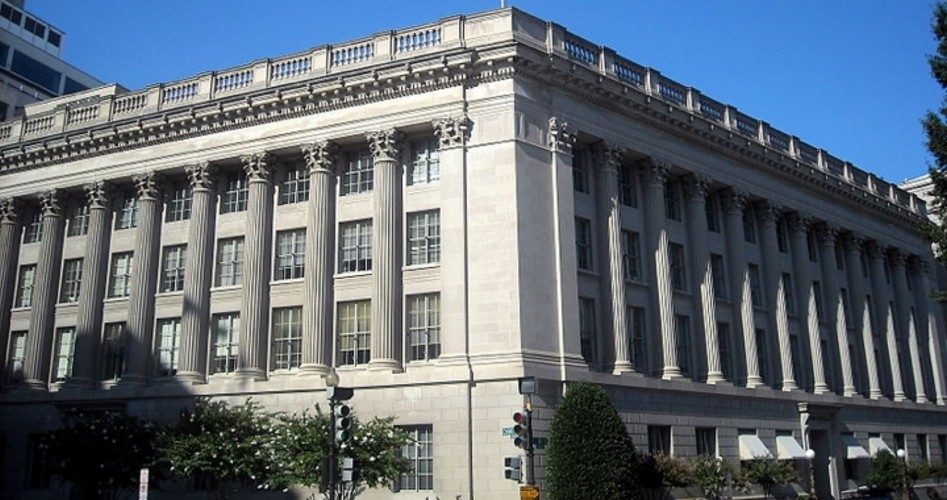
Fox News Sunday’s “Power Player of the Week” wants the GOP roster to be filled this fall with “the right kind of Republicans,” host Chris Wallace informed viewers of the weekly public affairs program.
Scott Reed, senior political strategist for the U.S. Chamber of Commerce, worries that “when a handful of bad actors” take over the Tea Party, “things get a little out of hand.” That’s why, he explained, the national Chamber has become a player in this year’s Republican primary elections, having successfully backed Senate Minority Leader Mitch McConnell in Kentucky and state Speaker of the House Tom Tillis in North Carolina against their Tea Party-backed opponents. The Chamber is also supporting six-term Sen. Thad Cochran in Mississippi against another Tea Party favorite, state Sen. Chris McDaniel, who is backed by a number of organizations slightly to the right of respectable “mainstream” Republicanism. Reed is appalled that a group such as the Senate Conservative Fund would raise money to try to defeat McConnell, the party’s leader in the Senate.
“This would be unheard of 20 years ago if anybody did that,” he said. “They would be run out of town.” And the free market-oriented Club for Growth, he laments, has “morphed into a very dangerous operation that goes out and recruits trial lawyers to run against members of Congress that have an over 90 percent record with the business community. I mean it’s absurd.”
An ad sponsored by the Chamber invites the viewer to “Meet the real Chris McDaniel, a personal injury class action trial lawyer using the courts to seek an enormous payday.” When the Chamber became opposed to enormous paydays is not clear, though the bias against trial lawyers, and especially personal injury lawyers, is plainly evident. But there are other, more fundamental reasons for the Chamber to recoil at a primary challenge to Cochran, 76, whose skill at leveraging appropriations for his district and state has been well honed over four decades in Congress. As Politico has described it, the incumbent’s “strategy for victory is straightforward: Stress his decades of bringing home federal largesse and his long relationships with home-state Republicans; tap Washington rainmakers to fill his campaign account; and bring in Mississippi political legends like Haley Barbour and Trent Lott to help seal the deal.”
McDaniel, 41, takes a considerably less benign view of “federal largesse.” In a recent appearance at the University of Mississippi, he defended his earlier designation of Mississippi as a “welfare state.” The state ranked second nationally for federal spending received per taxes paid, according to a 2007 study published by the Washington-based Tax Foundation.
“I’m not going to do anything for you,” McDaniel told the audience at Ole Miss. “I’m going to get the government off your back, then I’m gonna let you do it for yourself.”
Few, if any, would question Cochran’s ability to “bring home the bacon” — or the shrimp, as a Bloomberg report noted earlier this year in describing the “$25 million Thad Cochran Marine Aquaculture Center in Ocean Springs, Mississippi,” offering research and education programs on shrimp, blue crab, and red snapper. That’s an example of the kind of federal spending the state and the nation could well do without, his opponent insists. “To bring projects home with borrowed money that our children are going to have to pay back strikes me as problematic,” McDaniel told Bloomberg. “For every project, or piece of pork, that comes to Mississippi, thousands of others go to other states and at some point we have to recognize that our trajectory is not sustainable.”
The name recognition enjoyed by the six-term incumbent has been further enhanced by federal funds for an impressive array of research and academic projects resulting in the Thad Cochran Research Center at the University of Mississippi and the Thad Cochran Research, Technology and Economic Development Park adjacent to the campus of Mississippi State University, among other edifices bearing the Cochran brand. The senator, who is in line to regain the chairmanship of the Appropriations Committee if Republicans win control of the Senate this year, was the top seeker of the now banned “earmark” projects for his state in 2010, according to Citizens Against Government Waste, which totaled his requests at $490 million. Cochran, during a combined 41 years in the House and Senate, has not been responsible for all the spending that has pushed the national debt over the $17 trillion mark. But he has surely done his part.
The U.S. Chamber offers periodic warnings about the dangers posed by that debt. “As a nation and a people, we must finally face up to the single biggest threat to our economic future,” said Chamber President Thomas Donohue little more than a year ago, “and that is our exploding national debt, driven by runaway deficit spending, changing demographics and unsustainable entitlements.”
Yet the Chamber supported the $700-billion Troubled Assets Relief Program (TARP) to bail out the failed financial corporations in 2008, along with the auto company bailouts and the American Recovery and Reinvestment Act, the pork-laden Obama stimulus package with a price tag of $787 billion in 2009. As The New American noted here, the Chamber also supported reauthorization of the Foreign Intelligence Surveillance Act, with its provision for retroactive immunity for telecommunications companies that turned over customer call records to the government in warrantless searches. And it has supported the No Child Left Behind Act and the Common Core standards, apparently believing, against all evidence, that the growing involvement in education by the federal government will produce a better-educated workforce.
Chamber President Thomas Donohue last week issued a call for Congress to pass a comprehensive immigration reform bill. “If the Republicans don’t do it, they shouldn’t bother to run a candidate in 2016,” said Donohue, apparently believing that the mostly Hispanic immigrant voters will punish the GOP for not getting behind the proposed “path to citizenship.” But since huge majorities of Hispanic voters already vote Democratic — 71 percent for Obama in 2012 — it’s hard to see how Republicans stand to gain by extending the franchise to those here illegally.
“The Left hardly needs to lift a finger against tea-party candidates and activists who are bravely challenging the big-government status quo,” wrote Michelle Malkin in a recent column. “The Chamber has already volunteered to spend $50 million subsidizing the Republican incumbency-protection racket and attacking anti-establishment conservatives.”
The issue of “electability” is always raised when an anti-establishment candidate challenges the status quo. In 2010 Tea Party-backed candidates Christine O’Donnell in Delaware and Sharron Angle in Nevada won primaries, then lost to Democrats (in Angle’s case, to Senate Majority Leader Harry Reid) whom party officials claimed could have been beaten by more “centrist” candidates. In the Indiana primary in 2012, Richard Mourdock defeated six-term U.S. Senator Richard Lugar only to lose to Democrat Joe Donnelly in November.
But other Tea Party favorites won primaries when all the party leadership was lined up against them, then went on to defeat their Democratic opponents as well. Ted Cruz scored a huge upset over Lieutenant Governor David Dewhurst, whose list of endorsements was a virtual “Who’s Who” in Texas. Marco Rubio began his campaign against Gov. Charlie Crist as the underdog in the GOP Senate primary in Florida in 2010 before Crist became so unpopular among Republicans that he dropped out to run, and lose, as an Independent. And in that same year Mitch McConnell and the U.S. Chamber of Commerce backed Kentucky Secretary of State Trey Grayson against Rand Paul when the conventional wisdom was that Paul was too far right to win election to the U.S. Senate. Wrong again.
Experience isn’t always the best teacher, but it’s possible the political judgment of Scott Reed, the Chamber’s political strategist, has improved some since he managed the wildly successful Bob Dole for President campaign in 1996. Then again, maybe not.
Photo of U.S. Chamber of Commerce building in Washington, D.C.



